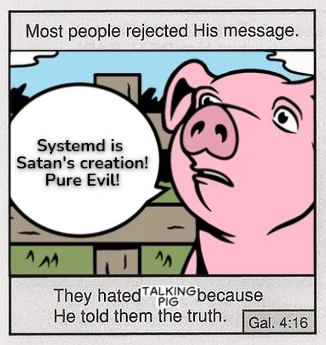Upvoted because it belongs in this community, and should not be silenced, even though it is the wrong opinion
I don't really get the hate for systemd. At least for someone who started really using Linux after it was introduced, it always seemed easier to control and manage than the init.d stuff.
Obviously it's a hassle to migrate if you have a ton of legacy services, but it's pretty nice.
It's because you now need to do systemctl restart sshd instead of /etc/init.d/sshd restart, I see no other reason than having to learn new syntax.
Arguably, init.d scripts were easier to understand, and systemd is a bit of a black box, it somehow works, but who knows where it writes logs or saves the process pid (it's all in the documentation somewhere), with init.d script you can just open the script itself and look.
I think it's okay to not 100% know every little detail of how a system works, as long as it's possible to find out what you need when you need it.
I prefer the ini files systemd uses to bash scripts
Systemd syntax is not that hard if you read the manual. I think every hardcode Linux user hates systemd because it automatically does the thinkering for you and you can control your processes with simple commands
Yeah, the manpages for systemd are large but also informative. Most of us only use a small subset of the features—much like we never explored everything possible with separate init programs.
Having used Linux on the desktop for some two decades and worked as a Linux sysadmin for a good while I don't miss the init scripts. My impression is more that a certain cohort wants to pretend that service management is easy by ignoring large amounts of it. It's easy to write a bad init script that breaks when you really need it, or be out of your depth with more complex cases.
Not to mention the whole conformity by convention thing. Systemd unit files are descriptive and predictable by their nature. So-called init scripts didn't really have to be scripts, they just usually were, and their arguments and output and behaviour was also unenforced—there's nothing really stopping you from writing a compiled program that self-daemonizes and place the binary with the init scripts rather than in /bin. Ultimately people who make programs also have to be good at writing init programs with that setup.
So we'd have people doing dumb shit themselves and getting angry at others doing dumb shit. PHP was also pretty popular and full of dumb shit. Lots of "worse is better" to go around.
Ultimately it's more of the stuff covered in Bryan Cantrill's Platform as a reflection of values. Some of us value predictability and correctness, others feel it's a straitjacket. There's no way of pleasing everyone with the same platform.
And currently the people who want to distribute their own riced-out init programs in bash, perl, php, node.js and so on are SOL. (They can still use them on their own machines.)
The more I actually learn about systemd, the cooler it is.
For example, you can automatically mount SMB shares using systemd, with automatic remount on failures. It's far superior to using fstab once you know how.
https://anteru.net/blog/2019/automatic-mounts-using-systemd/
Don’t minimize those strengths. Init.d scripts are something you can figure out just knowing a bit of shell script, or historical knowledge from before there was an internet. For something I rarely use, why do I need to learn something more complex to do the same thing - I either haven’t been sold on all the new functionality they piled in or do not need it. After all these years crowing about the Unix/linux way being many independent flexible tools that can work together, why do we now have this all-in-one monstrosity that might as well have come directly from Microsoft?
Install what you want we're in the land of the free (and open source software) here
system d struggle sessions should be integrated into SystemD
You don't have to use systemd. However, the rest of the world left you behind. Systemd isn't controversial since everyone has adopted it. No one is making you use it but keep in mind you are a very small minority. The rest if the community moved on after systemd was release 10 years ago.
This is fine for the memes but outside of that it is silly.
Windows isn’t controversial since everyone has adopted it. No one is making you use it but keep in mind you are a very small minority.

Windows has about 80% market share (decreasing) in a very specific and shrinking niche (desktop PC's).
All other computing devices used by most people daily on the client and server side are dominated by some form of Linux or BSD.
In practice, what makes it so bad?
It's new and different, and the Linux boomers who are still stuck on ALSA and ext2 hate it.
what are the better alternatives for ALSA and ext2 ?
PipeWire and btrfs
what is it? systemD is new?
When you entered the scene before epoch 0 I guess it is.
Everything else aside, my biggest gripes are with service control. Instead of just "service" they had to invent a new name that was super close to an existing function (systemctl vs sysctl) and reverse the switch order. (service sshd stop vs systemctl stop sshd.service)
Besides that, I absolutely hate that all the service configs are not in a standard location. Well, you get things like sshd.conf which are still in etc, but the systemctl configs are who knows where.
There are more important things to hate on with systemd, but I went for the superficial this time and I absolutely hate service management with systemd now.
wrt conf file location, they're only generally in /usr/lib/systemd, /etc/systemd, or /run/systemd. You can always find out what's getting read with systemctl cat <service-name>. Way easier to find stuff than with some other random programs imo, I've seen crap have default conf files in dumb places like /usr/share/<service-name>/lib/etc.
Bad usability, binary logs, crummy architecture.
There is nothing wrong about it, also it's easy to use which is a plus to me
Hard disagree, I have been using Linux for over two decades and find sysd superior to sysv
I'm about 2 decades in too, really not here to argue since everything has already been said multiple times. I do see systemd in a somewhat similar light as Pulseaudio. Yes, some good ideas there and it's a useful tool, but it wasn't the be-all end-all solution.
Syswire when?
Poettering worked for Red Hat from 2008 to 2022.[2][3] He then joined Microsoft.
In 2017, Poettering received the Pwnie Award for Lamest Vendor Response to vulnerabilities reported in systemd.
This Mastodon stream from Lennart Poettering describes a sudo replacement — called run0 — that will be part of the upcoming systemd 256 release. It takes a rather different approach to the execution of privileged commands, avoiding the use of setuid (which he calls "SUID") permissions entirely.
Basically Microsoft bloat confirmed, everyone switch back to OpenRC lol
Maybe, but SysV Init was just fucking awful. It's a shame.
Now we just need to find a way to integrate systemd into wayland and watch people lose their mind.
It sort of is, the whole elogind thing.
I still can't wrap my head around why SystemD has become the defacto standard & why aren't devs trying out OTHER init-systems
- It was doing new things.
- It was easier to learn.
- The other init systems were (are) stagnant.
Imagine trying to get new, young developers to adopt C or Pascal when the likes of Rust and Python exist. You can make arguments for a thing's superiority based on moral standards (which are always subjective), but morality is a poor metric. If everything was done based on that, the Linux ecosystem would be in the same state as the GNU Hurd kernel.
It's pretty good at starting services. It just keeps adding bundled things people wouldn't use otherwise, in a fairly microsoft fashion
The choice of init system is up to the distro maintainers because init scripts are usually created and maintained by the packager of a given application. Debian for example chose its init system via a democratic vote. Distros that focus on different init systems exist, like the Debian fork Devuan.
It's not evil. It's merely
- the wrong tool
- built wrong
- on wrong principles
- by a bad team
- who has poor coding and interaction
and now RedHat's wunderkinder has moved onto Microsoft where he's a better fit. Ideally, we can go back to Linux again.
Simple.
As someone who ran security for an enterprise OS company, I can't see why there's any debate on this. Are we used to choosing comfy things despite the safety concerns, now, or just when Lennart shits them out?
Are we used to choosing comfy things despite [...] concerns
People have been choosing convenience above everything else for a while, personally I find that doing so is even glorified at times.
I've never really had issues with systemd, but I must say when I was setting up void I did really enjoy the runit init system 🤷♂️
Hueheue i use artix btw
Yeah, I'm planning to switch from Arch to Gentoo. Systemd isn't the only reason, but it's a big one.
(Yes, I know about Artix, but it's... kindof a Frankenstein's monster, still mostly depending on the Arch repos and still with certain relics of Systemd. Or at least it was when I last tried it.)
If you like Arch you might like Void, it has roughly similar ideals and a very fast package manager. No AUR equivalent though.
linuxmemes
Hint: :q!
Sister communities:
Community rules (click to expand)
1. Follow the site-wide rules
- Instance-wide TOS: https://legal.lemmy.world/tos/
- Lemmy code of conduct: https://join-lemmy.org/docs/code_of_conduct.html
2. Be civil
- Understand the difference between a joke and an insult.
- Do not harrass or attack members of the community for any reason.
- Leave remarks of "peasantry" to the PCMR community. If you dislike an OS/service/application, attack the thing you dislike, not the individuals who use it. Some people may not have a choice.
- Bigotry will not be tolerated.
- These rules are somewhat loosened when the subject is a public figure. Still, do not attack their person or incite harrassment.
3. Post Linux-related content
- Including Unix and BSD.
- Non-Linux content is acceptable as long as it makes a reference to Linux. For example, the poorly made mockery of
sudoin Windows. - No porn. Even if you watch it on a Linux machine.
4. No recent reposts
- Everybody uses Arch btw, can't quit Vim, <loves/tolerates/hates> systemd, and wants to interject for a moment. You can stop now.
Please report posts and comments that break these rules!
Important: never execute code or follow advice that you don't understand or can't verify, especially here. The word of the day is credibility. This is a meme community -- even the most helpful comments might just be shitposts that can damage your system. Be aware, be smart, don't fork-bomb your computer.
